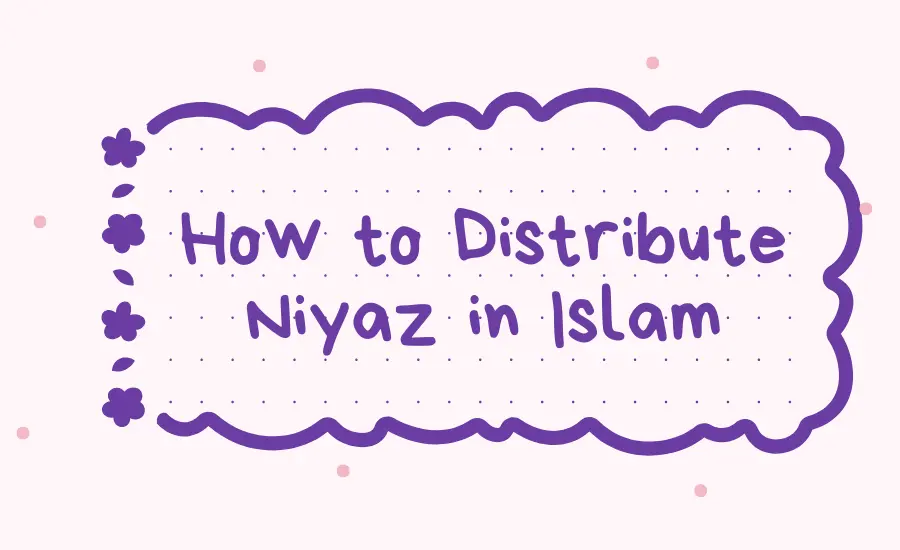In Islam, Niyaz (نِياز) refers to an act of offering food or charity with the intention of seeking Allah’s blessings and earning reward (sawab). It is often performed in remembrance of the Prophets (peace be upon them), Ahl-e-Bayt, or pious saints (awliya Allah). Muslims distribute niyaz to express gratitude, devotion, and charity, ensuring that others benefit from what Allah has provided.
The word Niyaz comes from Persian and means “supplication” or “offering.” Though not an obligatory act like zakat or sadaqah, Niyaz holds deep spiritual and communal value when done with the right intention (niyyah), purely for the sake of Allah. The main purpose of Niyaz in Islam is to:
- Express gratitude to Allah for His blessings
- Remember the righteous and follow their example of generosity
- Feed the needy and poor, strengthening community ties
- Seek barakah (blessing) and spiritual benefit for oneself and family
It is not merely about distributing food, but about sharing kindness, love, and remembrance of Allah.
The Islamic Ruling on Niyaz
In Islam, giving food to others for Allah’s sake is considered a form of sadaqah (charity), which is highly rewarded. Allah ﷻ says in the Qur’an:
وَيُطْعِمُونَ الطَّعَامَ عَلَىٰ حُبِّهِ مِسْكِينًا وَيَتِيمًا وَأَسِيرًا
“And they give food, despite their love for it, to the needy, the orphan, and the captive.” – (Surah Al-Insan, 76:8)
This verse shows that feeding others is a noble act that brings reward and purifies the heart. Therefore, Niyaz is permissible and recommended when done sincerely for Allah’s sake — not for show, competition, or superstition.
However, it is crucial to remember that niyaz cannot be offered in the name of anyone besides Allah. The Qur’an clearly forbids consuming or dedicating anything in the name of others:
إِنَّمَا حَرَّمَ عَلَيْكُمُ الْمَيْتَةَ وَالدَّمَ وَلَحْمَ الْخِنزِيرِ وَمَا أُهِلَّ بِهِ لِغَيْرِ اللَّهِ ۖ فَمَنِ اضْطُرَّ غَيْرَ بَاغٍ وَلَا عَادٍ فَلَا إِثْمَ عَلَيْهِ ۚ إِنَّ اللَّهَ غَفُورٌ رَحِيمٌ
“He has only forbidden you to eat carrion, blood, swine, and what is slaughtered in the name of any other than Allah. But if someone is compelled by necessity, neither driven by desire nor exceeding immediate need, they will not be sinful. Surely Allah is All-Forgiving, Most Merciful.” – (Surah Al-Baqarah, 2:173)
This verse highlights that all acts of worship, including niyaz and food offerings, must be dedicated solely to Allah. Associating any other name in such acts is not permissible in Islam. The intention (niyyah) must remain pure, seeking only Allah’s pleasure and mercy.
How to Distribute Niyaz in Islam – Step by Step
Distributing Niyaz in Islam requires sincerity, cleanliness, and compassion. It’s not just about sharing food but about spreading barakah (blessing) and remembering Allah through generosity. Below is a step-by-step guide to help you perform niyaz the right way according to Islamic principles.
1. Make a Pure Intention (Niyyah)
Before preparing or distributing niyaz, make a clear intention that this offering is solely for Allah’s pleasure and for the remembrance of His beloved servants. Avoid intentions tied to worldly gains, status, or ostentation.
2. Prepare Halal Food
The food prepared must be halal (permissible) and clean, ensuring no haram ingredients or doubtful sources are used. Purity in food reflects purity in faith. Prophet Muhammad ﷺ said:
“Allah is pure and accepts only that which is pure.” – (Sahih Muslim, 1015)
3. Choose the Right Time
Niyaz can be distributed on any day, but many Muslims prefer special Islamic days such as:
- Urs of saints (Awliya Allah)
- Milad-un-Nabi ﷺ
- Eid Milad gatherings
- Days of Ashura or Sha’ban
- Personal occasions (like recovery, birth, or success)
However, it is not mandatory to fix a specific date, the focus should always remain on sincerity.
4. Distribute to All – Especially the Needy
Islam encourages inclusive giving. You may distribute niyaz among:
- Poor and needy people
- Relatives and neighbors
- Friends and community members
- Mosque attendees or orphans
Prioritize the underprivileged, as Prophet ﷺ emphasized feeding the hungry as one of the best deeds.
Hadith:
“Feed the hungry, visit the sick, and free the captive.” – (Sahih Bukhari, 5373)
5. Begin with Bismillah
Before serving or distributing, recite:
بِسْمِ اللَّهِ الرَّحْمَـٰنِ الرَّحِيمِ
Bismillah ir-Rahman ir-Raheem
In the name of Allah, the Most Gracious, the Most Merciful.
This brings barakah (blessing) in the food and reminds everyone that the offering is from Allah.
6. Avoid Waste and Show-off
Islam strongly discourages extravagance (israf) and showing off (riya).
Qur’an:
“Indeed, the wasteful are brothers of the devils.” (Surah Al-Isra, 17:27)
Therefore, distribute niyaz humbly and moderately, ensuring no food is wasted.
7. Offer Dua After Distribution
After distributing niyaz, make dua (supplication):
اللهم تقبل منا إنك أنت السميع العليم
Allahumma taqabbal minna innaka anta as-sami’ul-‘aleem
O Allah, accept from us, indeed, You are the All-Hearing, All-Knowing.
Pray for the deceased, family, and all Muslims, seeking Allah’s mercy and guidance.
Common Types of Niyaz in Islamic Tradition
Throughout Islamic history, various forms of niyaz have been practiced to honor Allah and remember His beloved servants. Each type carries its own spiritual meaning and historical significance, often linked to pious figures or blessed occasions. Below are some of the most common types of niyaz observed by Muslims around the world.
- Niyaz of Imam Hasan (RA) & Imam Hussain (RA) for remembering their sacrifice and devotion.
- Niyaz of Saints and Prophets
- Niyaz for Shaban or Rajab, to seek blessings in sacred months.
- Personal Niyaz for health, gratitude, or a fulfilled wish.
All these are forms of voluntary charity, permissible if done with correct belief and no element of shirk (associating partners with Allah).
Important Points to Remember
While performing niyaz, it’s essential to keep the intention pure and the practice within Islamic guidelines. The act should always align with the teachings of the Qur’an and Sunnah, free from any superstition or extravagance. Here are some key points to remember to ensure your niyaz remains sincere and rewarding.
- Niyaz should never replace obligatory acts like zakat, fasting, or prayer.
- Do not believe niyaz automatically brings results, it is a means of dua and charity.
- Always avoid superstitions or innovations (bid‘ah) not supported by Quran or Sunnah.
- Keep the act modest, sincere, and beneficial.
Spiritual Benefits of Niyaz
Beyond its charitable aspect, niyaz holds deep spiritual rewards for the giver and the receiver alike. It helps purify the heart, strengthen faith, and bring barakah into one’s life and home. Here are some of the spiritual benefits of niyaz that reflect its true essence in Islam.
- Increases barakah in home and sustenance
- Brings unity among Muslims through shared meals
- Earns forgiveness and mercy from Allah
- Strengthens faith and gratitude in daily life
Conclusion: The Essence of Niyaz in Islam
The true essence of Niyaz in Islam lies in intention, sincerity, and charity. It is not about ritual or custom, it is about sharing Allah’s blessings with His creation. Whether done in remembrance of a saint, a loved one, or simply to thank Allah, niyaz should always be rooted in gratitude, humility, and service. Just remember that niyaz is haram as per Quranic direction (2:173) which says any food dedicated to anyone other than God is haraam. By following the teachings of the Qur’an and Sunnah, Muslims can ensure their niyaz becomes a source of reward, unity, and spiritual growth, Insha’Allah.
FAQs About Niyaz in Islam
Is Niyaz compulsory in Islam?
No, Niyaz is not obligatory. It is a voluntary act of charity done for Allah’s sake and to help others.
Can niyaz be distributed to non-Muslims?
Yes. Feeding anyone hungry is an act of goodness in Islam. The Prophet ﷺ often shared food with neighbors regardless of faith.
Can women organize or distribute niyaz?
Absolutely. Women can prepare, contribute, and distribute niyaz with proper modesty and intention.
What should be recited before distributing niyaz?
Recite Bismillah and make dua for Allah’s acceptance and blessings.
Can niyaz be done for the deceased?
Yes, many scholars permit giving food or charity on behalf of the deceased as an act of sadaqah jariyah (continuous charity).






